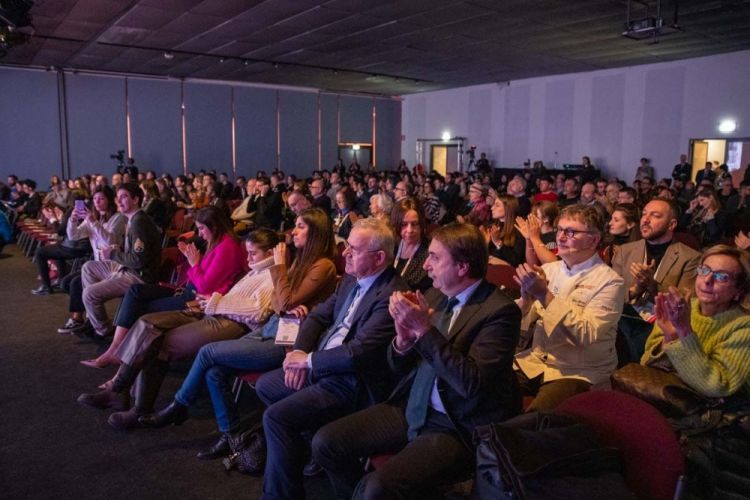Harold McGee is one of the world's most knowledgeable food science researchers and popularisers. His book On food and cooking, published almost forty years ago in 1984, is a milestone that has influenced generations of cooks - classic and avant-garde - and contributed decisively to raising gastronomy to the same level as the more traditional sciences.
For this reason, the presence of Harold McGee (find his official website here) on the stage of Identità Milano 2023 as the first real speaker of the day after Davide Rampello's introduction, made us very proud. Gabriele Zanatta of Identità Golose and British culinary journalist Ryan King introduced him on stage, and later talked with McGee in front of the Auditorium audience.
The conversation focused on the latest work by the American scholar (born in Cambridge, Massachusetts and raised in Chicago), a fascinating book dedicated to the sense of smell, to odours and aromas:
Nose dive. A field guide to the world's smells. It’s one of
Time magazine's books of the year 2020. “Since the beginning of my professional career and my work on these topics,”
McGee explained from the stage of
Identità Milano, “I have always been driven by curiosity: where does the pleasure of cooking come from? Where do the feelings of satisfaction we feel when we eat something we like come from? What triggers them?”
In the search for answers to these questions, Harold McGee started to explore smell and aromas: “The true complexity of our sensations regarding taste is derived from the sense of smell. This is why I speak of aromas and not flavours, because it is from the combination of taste and smell that we experience this pleasure. By studying the role of the sense of smell in the process, I realised that in both inhaling and exhaling we gather information and sensations. And by controlling these two phases of breathing, we can better capture sensory information.”
When we talk about the sense of smell, after the Covid pandemic outbreak that deprived many people of their ability to perceive smells and tastes, we are also talking about a sensitive subject.
Ryan King asked
McGee if and how we can try to return to the way we used to smell and taste. "We can train our sense of smell," replied
Harold McGee, "and this is something I do often. I also did it to recover my sense of smell after getting Covid myself. We must pay attention, focus, on our olfactory sensations, something we often forget to do. And then we must smell as much as possible. Smell when we are out and about, by strata. Go to the larder and open the containers with the strongest and most distinctive-smelling ingredients. Our brain stores a database of smells that we must expand and confirm daily.”

The audience listens to Harold McGee's talk (on the right, in the front rows, there’s chef Andoni Luis Aduriz from Mugaritz)
This is also what culinary professionals who want to broaden their olfactory sensitivity can do: “Professionals in the perfume industry or wine tasters train this way too. We have a very intense and ancient relationship with the sense of smell, which has a fundamental and ancestral importance for human beings, since thanks to this sense we could understand how to explore the world around us, and recognise the good and the threat.
This is why scents and odours can trigger memories and emotions linked to our memory in such a simple and natural way. This is also why many chefs in recent years have worked to propose multisensory experiences in which aromas and scents play a key role. However, this brings with it other problems, because it’s very complex to control the propagation of odours in the air. There’s a strong risk of confusing the senses.”
We hear more and more about
AI, artificial intelligence: will it ever be possible to use these tools to work on smell and odours,
Ryan King wondered. And
Harold McGee's answer was positive: “There is a very interesting project called
Osmo which leads a team of researchers to identify the dozens and dozens of molecules that are responsible for the smells we perceive. The aim is to be able to predict the smell of substances we do not know, just by studying their molecules. The tests carried out so far have yielded very positive results...”
In search of new, fascinating revolutions.
Translated into English by Slawka G. Scarso